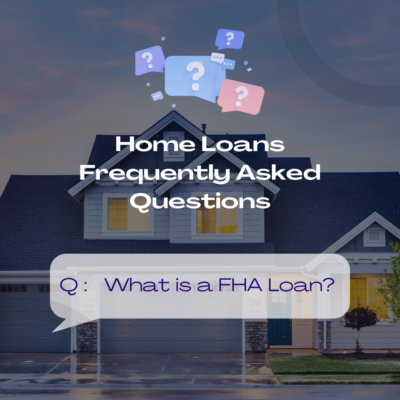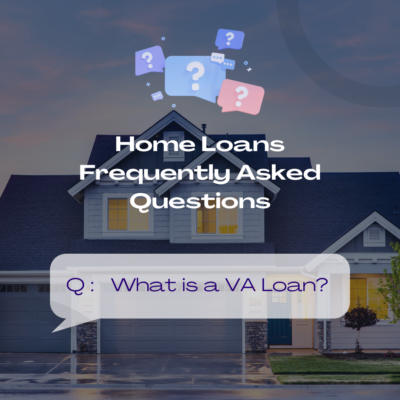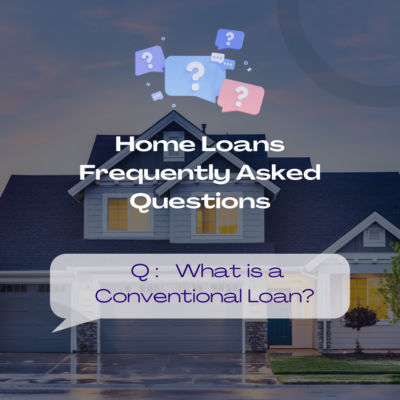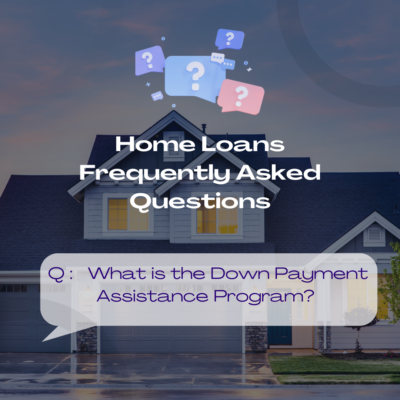Resources to help you with home buying
Here are some common questions that are asked. I’m happy to clarify anything here over a phone call.

An FHA loan, also known as a Federal Housing Administration loan, is a type of mortgage loan that is insured by the Federal Housing Administration, which is a division of the U.S. Department of Housing and Urban Development (HUD).
FHA loans are designed to make homeownership more accessible and affordable for first-time homebuyers, low-to-moderate-income borrowers, and individuals with less-than-perfect credit. These loans are particularly popular among borrowers who may not qualify for conventional loans due to stricter lending criteria.
Here are some key features of FHA loans:
Mortgage Insurance: One of the main benefits of FHA loans is that they are insured by the FHA. This insurance protects the lender against losses if the borrower defaults on the loan. As a result, lenders are more willing to extend loans to borrowers with lower credit scores and smaller down payments.
Lower Down Payment: FHA loans typically require a lower down payment compared to conventional loans. While the specific amount can vary, borrowers may be able to put down as little as 3.5% of the purchase price as a down payment. This can be advantageous for buyers who have limited funds available for a down payment.
Flexible Credit Requirements: FHA loans are known for being more lenient when it comes to credit requirements. Borrowers with credit scores as low as 500 may be eligible for an FHA loan, although a higher score will generally be more favorable. However, individual lenders may still have their own minimum credit score requirements.
Limits on Loan Amounts: FHA loans have maximum loan limits that vary depending on the location of the property. These limits are set by HUD and are intended to reflect the average home prices in a particular area. Loan limits can change annually to account for changes in housing prices.
Mortgage Insurance Premiums: Borrowers are required to pay an upfront mortgage insurance premium (MIP) at the time of closing, as well as an annual MIP that is divided into monthly payments. These premiums help fund the FHA’s insurance program and protect the lender. The amount of the MIP depends on factors such as the loan amount and the loan-to-value ratio.
It’s important to note that while FHA loans provide many benefits, they also have certain restrictions and requirements. For example, the property being purchased must meet certain standards set by the FHA, and borrowers may be subject to debt-to-income ratio limits. Additionally, FHA loans are primarily intended for owner-occupied properties, so they are not typically available for real estate investors.
If you’re interested in obtaining an FHA loan, please reach out to me at 310.779.7304 to discuss your specific financial situation and eligibility criteria with them. You can also book a time to chat with me
Learn more about Laura L Polanco.
See some of the home ownership tools I offer including Mortgage Calculators and Frequently Asked Questions.
Learn what is the Maximum Loan amount for a FHA Loan in California
Learn about how to get an FHA Loan in CA
(Disclaimer: This article is for informational purposes only and should not be considered financial advice. Please consult with a qualified financial advisor or FHA-approved lender for personalized guidance.)

A VA loan refers to a mortgage loan program available in the United States that is guaranteed by the Department of Veterans Affairs (VA). VA loans are designed to assist eligible active-duty military personnel, veterans, and surviving spouses in obtaining homeownership.
Here are some key features of VA loans:
VA Loan Guarantee: The VA guarantees a portion of the loan provided by private lenders, which reduces the risk for lenders and allows them to offer more favorable terms to borrowers. This guarantee serves as a form of insurance, protecting lenders against losses if the borrower defaults on the loan.
No Down Payment: One of the significant benefits of VA loans is that they often do not require a down payment. Eligible borrowers can finance the entire purchase price of the home without having to make a down payment, making it easier for them to become homeowners.
No Mortgage Insurance: Unlike many other types of mortgage loans, VA loans do not require private mortgage insurance (PMI). PMI is typically required when a borrower puts down less than 20% on a conventional loan. The absence of PMI can result in lower monthly mortgage payments for VA loan borrowers.
Competitive Interest Rates: VA loans generally offer competitive interest rates that are comparable or even lower than those of conventional loans. This can result in long-term savings for borrowers.
Flexible Credit Requirements: VA loans are often more forgiving when it comes to credit requirements. While specific lenders may still have their own credit score requirements, VA loans generally have more flexible guidelines compared to conventional loans, making them accessible to a broader range of borrowers.
Funding Fee: Borrowers are required to pay a funding fee, which is a one-time cost associated with obtaining a VA loan. The funding fee amount varies depending on factors such as the borrower’s military service category, down payment amount (if any), and whether it is the borrower’s first or subsequent use of a VA loan. The funding fee helps offset the cost of the VA loan program.
It’s important to note that VA loans are intended for primary residences and are not available for purchasing investment properties or vacation homes. Additionally, eligibility for VA loans is determined by meeting certain service requirements, such as minimum active-duty service periods or specific criteria for veterans and surviving spouses.
To apply for a VA loan, individuals need to obtain a Certificate of Eligibility (COE) from the VA. It is advisable to connect with lenders who are experienced with VA loans and have VA loan specialists who can guide borrowers through the application process.
It’s worth noting that while I strive to provide accurate and up-to-date information, loan programs and their specific details can change over time. Therefore, it’s recommended to consult with the Department of Veterans Affairs or a qualified mortgage professional for the most current and personalized information regarding VA loans.
If you’re interested in obtaining an VA loan, please reach out to me at 310.779.7304 to discuss your specific financial situation and eligibility criteria with them. You can also book a time to chat with me by clicking here.
Learn more about Laura L Polanco.
See some of the home ownership tools I offer including Mortgage Calculators and Frequently Asked Questions.
Learn what is the Maximum Loan amount for a FHA Loan in California
Learn about how to get an FHA Loan in CA
(Disclaimer: This article is for informational purposes only and should not be considered financial advice. Please consult with a qualified financial advisor or FHA-approved lender for personalized guidance.)

A conventional loan, also known as a conforming loan, is a mortgage loan that is not insured or guaranteed by a government agency like the Federal Housing Administration (FHA) or the Department of Veterans Affairs (VA). Instead, conventional loans are offered by private lenders such as banks, credit unions, and mortgage companies.
Here are some key features of conventional loans:
No Government Guarantee: Unlike FHA loans or VA loans, conventional loans do not have a government guarantee or insurance. This means that the lender bears the risk if the borrower defaults on the loan.
Down Payment Requirements: Conventional loans typically require a down payment of at least 3% to 20% of the purchase price, depending on the specific loan program and the borrower’s financial qualifications. The exact down payment requirement is determined by factors such as the borrower’s creditworthiness, loan-to-value ratio, and loan program.
Private Mortgage Insurance (PMI): If a borrower puts down less than 20% on a conventional loan, they will likely be required to pay for private mortgage insurance (PMI). PMI protects the lender in case of loan default. The cost of PMI can vary based on factors such as the borrower’s credit score, loan-to-value ratio, and the specific PMI provider.
Credit Requirements: Conventional loans typically have stricter credit requirements compared to government-backed loans. Lenders generally prefer borrowers with good credit scores (typically 620 or higher) and a solid credit history. A higher credit score can lead to more favorable loan terms, such as a lower interest rate.
Loan Limits: Conventional loans have loan limits set by the Federal Housing Finance Agency (FHFA). These limits determine the maximum loan amount that can be obtained through a conventional loan. The limits vary depending on the county and can change annually to reflect changes in housing prices.
Interest Rates: Conventional loans offer a range of interest rate options, including fixed-rate and adjustable-rate mortgages. The interest rates for conventional loans are influenced by market conditions, borrower qualifications, and the specific loan terms.
It’s important to note that while conventional loans are a common choice for many homebuyers, they may not be as accessible to individuals with lower credit scores or limited funds for a down payment. However, conventional loans offer more flexibility in terms of property types and can be used for primary residences, second homes, and investment properties.
When considering a conventional loan, it’s advisable to shop around and compare offers from different lenders to find the most competitive rates and terms based on your specific financial situation.
It’s worth mentioning that loan programs and their specific details can change over time. Therefore, it’s recommended to consult with a qualified mortgage professional or financial advisor for the most current and personalized information regarding conventional loans.
If you’re interested in obtaining a Conventional Loan, please reach out to me at 310.779.7304 to discuss your specific financial situation and eligibility criteria. You can also book a time to chat with me by clicking here.
Learn more about Laura L Polanco.
See some of the home ownership tools I offer including Mortgage Calculators and Frequently Asked Questions.
Learn what is the Maximum Loan amount for a FHA Loan in California
Learn about how to get an FHA Loan in CA
(Disclaimer: This article is for informational purposes only and should not be considered financial advice. Please consult with a qualified financial advisor or FHA-approved lender for personalized guidance.)

The Down Payment Assistance Program (DPA) is a type of assistance offered to homebuyers to help them overcome the financial hurdle of making a down payment when purchasing a home. It is designed to provide additional funds or financial support to individuals who may have difficulty saving enough money for a down payment.
DPA programs are typically offered by various organizations, including state and local housing authorities, nonprofit organizations, and sometimes even private entities. The specific terms and availability of DPA programs can vary depending on the location and the organization offering the assistance.
Here are some common features and benefits of Down Payment Assistance Programs:
1. Financial Assistance: DPA programs provide financial assistance in the form of grants, forgivable loans, or low-interest loans to eligible homebuyers. These funds can be used towards the down payment and, in some cases, closing costs associated with purchasing a home.
2. Down Payment Requirements: DPA programs aim to help homebuyers who may not have sufficient funds for a traditional down payment. Depending on the program, the assistance provided can cover a significant portion or even the full amount of the required down payment.
3. Eligibility Criteria: DPA programs typically have specific eligibility criteria that applicants must meet to qualify for the assistance. These criteria can include factors such as income limits, credit score requirements, and the applicant’s status as a first-time homebuyer. It’s important to review and understand the specific requirements of each DPA program before applying.
4. Program Limitations: DPA programs often have limitations on the type of properties that can be purchased, such as restrictions on property location, price, or property condition. These limitations are in place to ensure that the assistance is targeted towards individuals who need it the most and to promote responsible homeownership.
5. Repayment Terms: The repayment terms for DPA programs can vary depending on the program. Some programs offer grants or forgivable loans, meaning that the funds do not need to be repaid if certain conditions are met, such as living in the home for a specified period. Other programs may provide loans with favorable terms, such as low-interest rates or deferred payments.
It’s important to note that DPA programs are often subject to availability and may have limited funds or specific application periods. Additionally, the availability and terms of DPA programs can change over time, so it’s recommended to research and stay updated on the programs offered in your area.
If you’re interested in accessing Down Payment Assistance Programs, please reach out to me at 310.779.7304 so I can provide information about the specific programs available in your region and guide you through the application process. You can also book a time to chat with me by clicking here.
Learn more about Laura L Polanco.
See some of the home ownership tools I offer including Mortgage Calculators and Frequently Asked Questions.
Learn what is the Maximum Loan amount for a FHA Loan in California
Learn about how to get an FHA Loan in CA
(Disclaimer: This article is for informational purposes only and should not be considered financial advice. Please consult with a qualified financial advisor or FHA-approved lender for personalized guidance.)